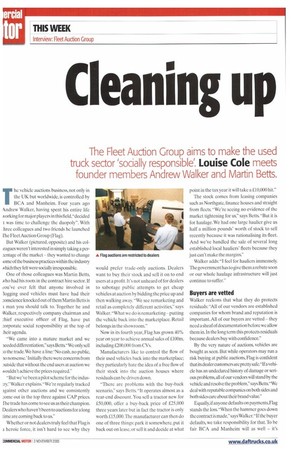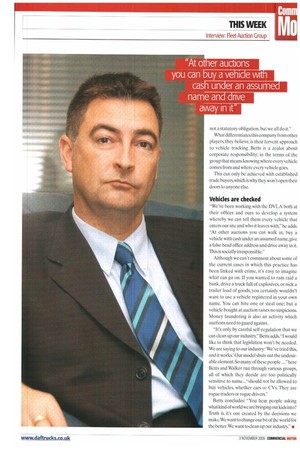C eaning u
Page 26

Page 27

If you've noticed an error in this article please click here to report it so we can fix it.
The Fleet Auction Group aims to make the used truck sector 'socially responsible'. Louise Cole meets founder members Andrew Walker and Martin Betts.
The vehicle auctions business, not only in the UK but worldwide, is controlled by BCA and Manheim. Four years ago Andrew Walker, having spent his entire life working for major players in this field,"decided t was time to challenge the duopoly". With .hree colleagues and two friends he launched Me Fleet Auction Group (Flag).
But Walker (pictured, opposite) and his coleagues weren't interested in simply taking a per:entage of the market they wanted to change iome of the business practices within the industry which they felt were socially irresponsible.
One of those colleagues was Martin Betts, who had his roots in the contract hire sector. If you've ever felt that anyone involved in logging used vehicles must have had their .:onscience knocked out of them Martin Betts is a man you should talk to. Together he and Walker, respectively company chairman and chief executive officer of Flag, have put :orporate social responsibility at the top of :heir agenda.
"We came into a mature market and we leededdifferentiation,"saysBetts."We only sell :o the trade. We have a line: `No cash, no public, rio nonsense.' Initially there were concerns from Jutside that without the end users at auction we wouldn't achieve the prices required."
"But we've been a pilot scheme for the industry," Walker explains. "We're regularly tracked against other auctions and we consistently ome out in the top three against CAP prices. The trade has come to see us as their champion. Dealers who haven't been to auctions for along time are coming back to us."
Whether or not dealers truly feel that Flag is 1 heroic force, it isn't hard to see why they would prefer trade-only auctions. Dealers want to buy their stock and sell it on to end users at a profit. It's not unheard of for dealers to sabotage public attempts to get cheap vehicles at auction by bidding the price up and then walking away. "We see remarketing and retail as completely different activities," says Walker. "What we do is remarketing -putting the vehicle back into the marketplace. Retail belongs in the showroom."
Now in its fourth year, Flag has grown 40% year on year to achieve annual sales of 1100m, including £200,000 from CVs.
Manufacturers like to control the flow of their used vehicles back into the marketplace; they particularly hate the idea of a free flow of their stock into the auction houses where residuals can he driven down.
-There are problems with the buy-back scenario," says Betts. "It operates almost as a rear-end discount. You sell a tractor new for £50,000, offer a buy-back price of £25,000 three years later but in fact the tractor is only worth115,000. The manufacturer can then do one of three things: park it somewhere, put it back out on lease, or sell it and decide at what point in the tax year it will take a £10,000 hit," The stock comes from leasing companies such as Northgatc, finance houses and straight from fleets. "We're seeing no evidence of the market tightening for us," says Betts. "But it is for haulage. We had one large haulier give us half a million pounds' worth of stock to sell recently because it was rationalising its fleet. And we've handled the sale of several long established local hauliers' fleets because they just can't make the margins."
Walker adds: "I feel for hauliers immensely. The government has to give them a rebate soon or our whole haulage infrastructure will just continue to suffer."
Buyers are vetted
Walker reckons that what they do protects residuals: "All of our vendors are established companies for whom brand and reputation is important. All of our buyers are vetted they need a sheaf of documentation before we allow them in. In the long term this protects residuals because dealers buy with confidence."
By the very nature of auctions, vehicles are bought as seen. But while operators may run a risk buying at public auctions, Flag is confident that its dealercustomers are pretty safe."ff a vehicle has an undeclared history of damage or serious problems, all of our vendors will stand by the vehicle and resolve the problem," says Betts."We deal with reputable companies on both sides and both sides care about their brand value."
Equally, if anyone defaults on payments,Flag stands the loss. "When the hammer goes down the contract is made," says Walker."If the buyer defaults, we take responsibility for that. To be fair BCA and Manheim will as well it's not a statutory obligation, but we all do it."
What differentiates this company from other players, they believe, is their fervent approach to vehicle tracking. Betts is a zealot about corporate responsibility: in the terms of the group that means knowing where every vehicle comes from and where every vehicle goes.
This can only he achieved with established trade buyers,which is why they won't open their doors to anyone else.
Vehicles are checked
"We've been working with the DVLA both at their offices and ours to develop a system whereby we can tell them every vehicle that enters our site and who it leaves with," he adds. "At other auctions you can walk in, buy a vehicle with cash under an assumed name, give a false head office address and drive away in it. This is socially irresponsible."
Although we can't comment about some of the current cases in which this practice has been linked with crime, it's easy to imagine what can go on. If you wanted to ram raid a bank, drive a truck full of explosives, or nick a trailer load of goods, you certainly wouldn't want to use a vehicle registered in your own name. You can hire one or steal one; but a vehicle bought at auction raises no suspicions. Money laundering is also an activity which auctions need to guard against.
"it's only by careful self-regulation that we can clean up our industry," Betts adds. "I would like to think that legislation won't be needed. We are saying to our industry: We've tried this, and it works.' Our model shuts out the undesirable element. So many of these people ...." here Betts and Walker run through various groups, all of which they decide are too politically sensitive to name... "should not be allowed to buy vehicles, whether cars or CVs. They are rogue traders or rogue drivers."
Betts concludes: "You hear people asking what kind of world we are bringing our kids into? Truth is, it's one created by the decisions we make.We want to change our bit of the world for the better.We want to clean up our industry." •










































































































































































































